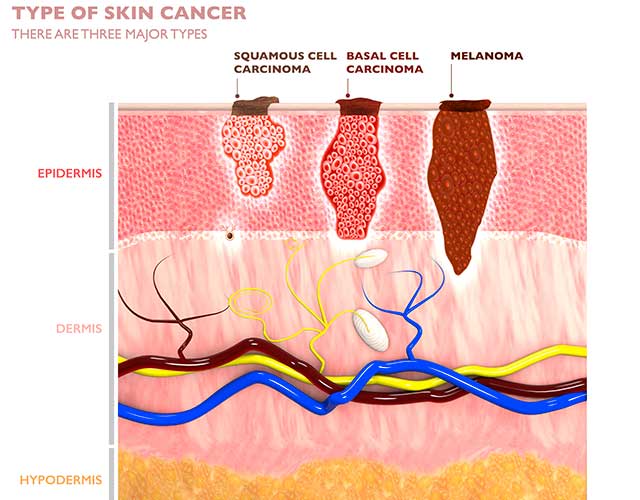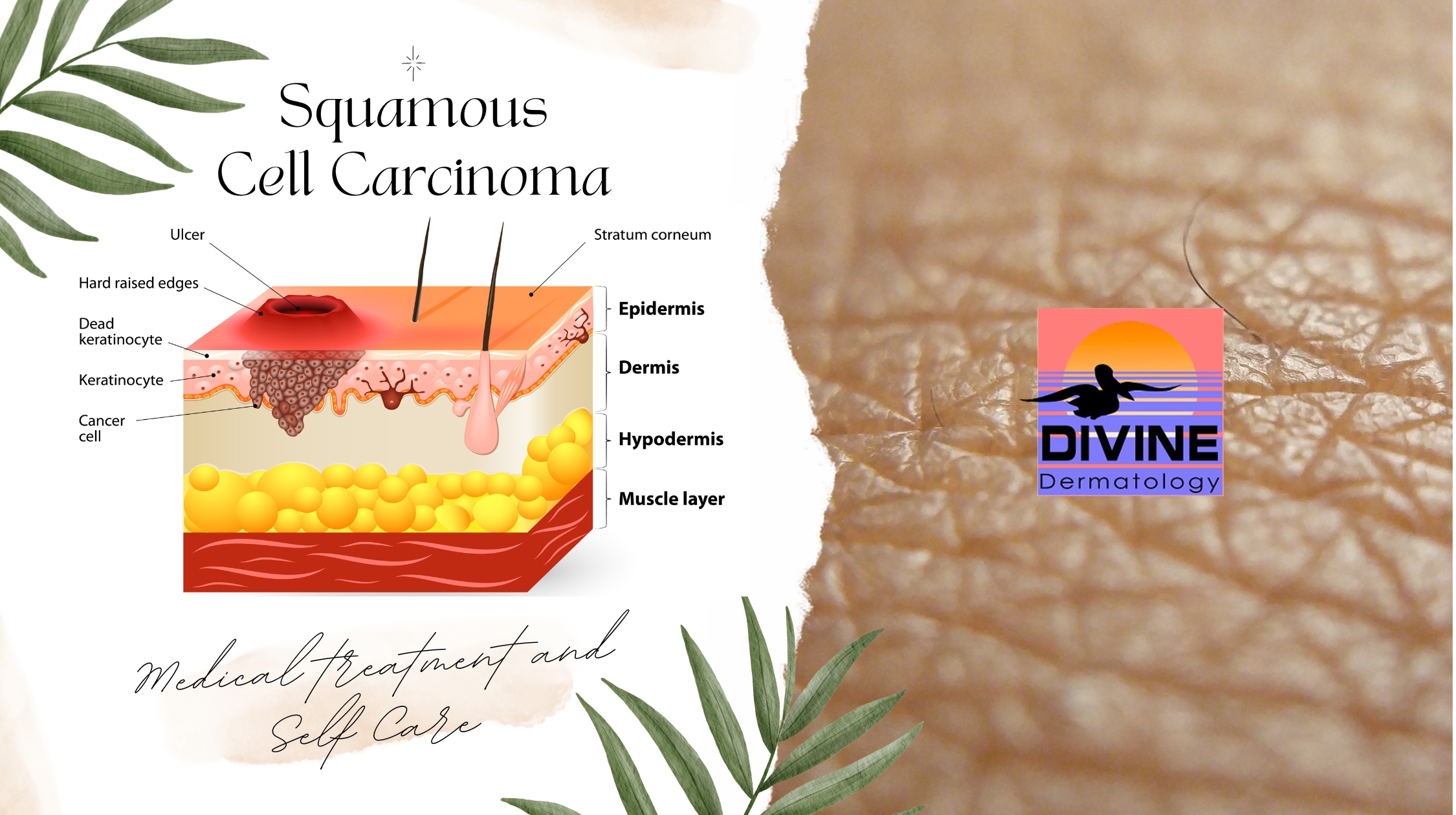Comprehensive Guide to Squamous Cell Carcinoma Self-Care
Introduction
Squamous cell carcinoma is a common type of skin cancer that arises from the squamous cells, which make up the outer layer of the skin. It often occurs in areas exposed to ultraviolet (UV) radiation, such as the face, ears, neck, and hands. Early detection and treatment are crucial for effective management and recovery. In addition to medical treatments, self-care plays a vital role in managing and preventing the recurrence of Squamous cell carcinoma. This article provides a comprehensive guide on self-care strategies for individuals with squamous cell carcinoma.

Understanding Squamous Cell Carcinoma
Squamous cell carcinoma is the second most common form of skin cancer, following basal cell carcinoma. It is characterized by the uncontrolled growth of abnormal squamous cells. Squamous cell carcinoma can appear as scaly red patches, open sores, warts, or elevated growths with a central depression. While it is usually not life-threatening, Squamous cell carcinoma can be aggressive and cause significant damage if left untreated. In some cases, it can spread to other parts of the body, making early intervention crucial.

Image Source: Moffitt Cancer Center
Medical Treatments for Squamous Cell Carcinoma
Before diving into self-care, it’s important to understand the medical treatments available for Squamous cell carcinoma. These treatments are often the first line of defense against the cancer and may include:
- Surgical Excision: Removing the tumor and a margin of healthy tissue.
- Mohs Surgery: A precise surgical technique that removes the cancer layer by layer, preserving as much healthy tissue as possible.
- Cryotherapy: Freezing the cancer cells with liquid nitrogen.
- Radiation Therapy: Using high-energy rays to destroy cancer cells.
- Topical Medications: Applying creams or ointments that contain cancer-fighting agents.
For expert care and personalized treatment plans, consider visiting Divine Dermatology. Their team of professionals is dedicated to providing the best possible care for Squamous cell carcinoma patients.
Self-Care Strategies for Squamous Cell Carcinoma
1. Sun Protection
One of the most critical aspects of self-care for Squamous cell carcinoma is protecting your skin from UV radiation, which is a major risk factor for developing and exacerbating skin cancer.
- Use Sunscreen: Apply a broad-spectrum sunscreen with an SPF of 30 or higher daily, even on cloudy days. Reapply every two hours, and after swimming or sweating. Choose a sunscreen that protects against both UVA and UVB rays.
- Wear Protective Clothing: Cover your skin with long-sleeved shirts, pants, wide-brimmed hats, and sunglasses. Clothing with a UPF rating offers additional protection.
- Seek Shade: Avoid direct sun exposure between 10 a.m. and 4 p.m., when UV rays are the strongest. When outdoors, seek shade under umbrellas, trees, or shelters.
- Avoid Tanning Beds: Tanning beds emit UV radiation that can increase your risk of developing Squamous cell carcinoma. Opt for sunless tanning products if you want a tanned look.
2. Regular Skin Checks
Performing regular skin checks is vital for early detection of any new or recurring skin issues.
- Monthly Self-Exams: Examine your skin from head to toe once a month. Use a mirror to check hard-to-see areas, and note any new growths, changes in existing moles, or unusual skin lesions. Keep a record or take photos of any changes to discuss with your healthcare provider.
- Annual Dermatologist Visits: Schedule yearly check-ups with a dermatologist, especially if you have a history of skin cancer or other risk factors. Professional skin exams can detect abnormalities you might miss. For thorough and compassionate care, Divine Dermatology is an excellent choice.
3. Healthy Lifestyle Choices
A healthy lifestyle can strengthen your immune system and improve your body’s ability to fight cancer.
- Balanced Diet: Eat a diet rich in fruits, vegetables, lean proteins, and whole grains. Antioxidant-rich foods, such as berries, nuts, and leafy greens, can help protect your skin cells. Omega-3 fatty acids found in fish, flaxseeds, and walnuts can also support skin health.
- Stay Hydrated: Drink plenty of water to keep your skin hydrated and healthy. Proper hydration helps maintain skin elasticity and function.
- Exercise Regularly: Engage in regular physical activity to maintain a healthy weight and improve overall well-being. Exercise boosts circulation, which can enhance skin health.
- Avoid Smoking and Limit Alcohol: Smoking and excessive alcohol consumption can weaken your immune system and increase cancer risk. Smoking is particularly harmful to skin health and can exacerbate damage from UV radiation.
4. Skin Care Routine
Proper skin care can help your skin heal and reduce the risk of irritation or infection.
- Gentle Cleansing: Use a mild, fragrance-free cleanser to wash your skin. Avoid scrubbing or using harsh exfoliants. Pat your skin dry with a soft towel instead of rubbing.
- Moisturizing: Apply a fragrance-free moisturizer to keep your skin hydrated and prevent dryness. Look for products containing ingredients like hyaluronic acid and ceramides, which help maintain the skin’s moisture barrier.
- Healing Ointments: If you have any wounds or surgical scars, use prescribed healing ointments to promote faster recovery. Silicone-based gels or sheets can help reduce scar formation and improve the appearance of existing scars.
5. Managing Side Effects
Medical treatments for Squamous cell carcinoma can cause side effects such as redness, swelling, and discomfort. Managing these side effects is crucial for your comfort and recovery.
- Pain Management: Over-the-counter pain relievers, such as ibuprofen or acetaminophen, can help alleviate pain and swelling. Follow your doctor’s recommendations.
- Cool Compresses: Applying cool, damp cloths to the affected area can reduce swelling and soothe irritation. Avoid applying ice directly to the skin, as it can cause further damage.
- Aloe Vera: Aloe vera gel can provide relief from minor skin irritations and promote healing. Ensure you use pure aloe vera without added fragrances or dyes.
Emotional and Mental Well-Being
Dealing with a cancer diagnosis can be emotionally challenging. Taking care of your mental health is an important aspect of self-care.
- Support Groups: Joining a support group can provide emotional support and practical advice from others who have faced similar challenges. Sharing experiences can reduce feelings of isolation and provide valuable coping strategies.
- Counseling: Professional counseling or therapy can help you cope with anxiety, depression, or other emotional issues related to your diagnosis. Therapists can offer techniques to manage stress and improve your mental well-being.
- Mindfulness and Relaxation: Practices such as meditation, yoga, and deep breathing can reduce stress and improve your overall sense of well-being. Mindfulness techniques can help you stay present and manage anxiety related to your health.
Preventive Measures for Recurrence
Preventing the recurrence of Squamous cell carcinoma involves ongoing vigilance and proactive measures.
- Follow-Up Appointments: Keep regular follow-up appointments with your healthcare provider to monitor for any signs of recurrence. Regular check-ups allow for early detection and treatment of any new or recurring issues. Divine Dermatology is committed to providing ongoing care to help prevent recurrence and ensure your long-term health.
- Adhere to Treatment Plans: Follow your treatment plan as prescribed by your healthcare provider, including any recommended medications or therapies. Consistent adherence to your treatment plan is crucial for long-term success.
- Educate Yourself: Stay informed about Squamous cell carcinoma and any new developments in treatment or prevention strategies. Knowledge empowers you to make informed decisions about your health.
Conclusion
Squamous cell carcinoma is a serious condition, but with the right self-care strategies, you can manage your health effectively and reduce the risk of recurrence. Protecting your skin from UV radiation, maintaining a healthy lifestyle, performing regular skin checks, and managing side effects are all crucial components of self-care. Additionally, taking care of your emotional well-being and staying vigilant with follow-up care will support your journey to recovery and long-term health. Remember, self-care is a vital part of your overall treatment plan, and it can make a significant difference in your quality of life and outcomes.
For personalized and comprehensive care, consider visiting Divine Dermatology to help guide you through your Squamous cell carcinoma journey. Taking proactive steps today can help ensure a healthier future.




